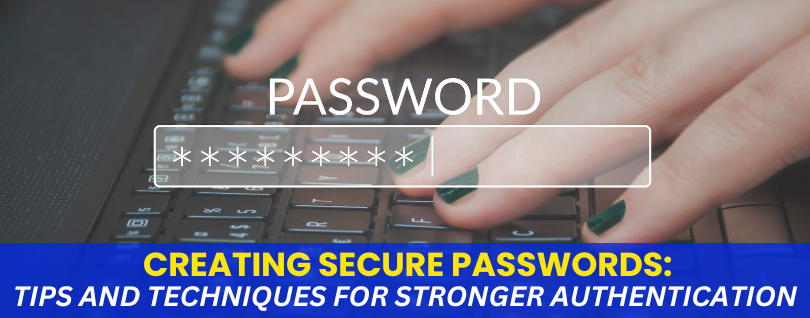itSynergy: Blog

Creating Secure Passwords: Tips and Techniques for Stronger Authentication
Creating a secure password is one of the simplest and most effective ways to protect your online accounts from unauthorized access.
Strong passwords are essential to safeguarding your personal information, financial data, and other sensitive information from hackers and cybercriminals.
In this article, we will provide you with tips and techniques for crafting a strong and secure password that is difficult to crack.
Crafting Your Strong Password:
A strong password is a combination of uppercase and lowercase letters, numbers, and symbols.
It should be at least 12 characters long and should not contain any personal information, such as your name, birth date, or address.
You should also avoid common words and phrases, as well as easily guessable patterns such as “password123” or “qwertyuiop.”
Enhancing Password Security:
In addition to creating a strong password, there are several other steps you can take to enhance your password security.
One of these is to use a password manager, which can generate and store complex passwords for you.
You can also enable two-factor authentication, which adds an extra layer of security to your accounts by requiring a second form of authentication, such as a fingerprint or code sent to your phone.
Key Takeaways
- A strong password is a combination of uppercase and lowercase letters, numbers, and symbols that is at least 12 characters long.
- Avoid using personal information, common words and phrases, and easily guessable patterns when creating your password.
- Enhance your password security by using a password manager and enabling two-factor authentication.
Crafting Your Strong Password
Creating a strong password is the first step to secure your online accounts.
A strong password is a combination of characters that is difficult for someone else to guess. Here are some tips to craft a strong password:
Understanding Password Complexity
Password strength is determined by the combination of characters used in your password.
A strong password should be at least 12 characters long and include a mix of uppercase and lowercase letters, numbers, and special characters.
The more complex your password, the harder it is for someone to guess or crack.
Avoiding Common Pitfalls
Avoid using dictionary words, pet names, sports teams, or hobbies in your password. These are common passwords that can be easily guessed by attackers.
Don’t use popular passwords like “123456” or “password” either.
Also, avoid reusing passwords across different accounts. If one account is compromised, all your other accounts with the same password become vulnerable.
Creating Memorable Yet Secure Passwords
One way to create a memorable password is to use a passphrase.
A passphrase is a sequence of unrelated words that are easy to remember but hard to guess. For example, “correct horse battery staple” is a passphrase that is easier to remember than a random string of characters.
You can also use mnemonic phrases to create a strong and memorable password. For instance, you could take a sentence like “My first car was a red Toyota in 2020” and turn it into a password like “MfcwarT@2020!”.
Enhancing Password Security
Creating secure passwords is a crucial part of staying safe online. However, there are several other steps you can take to enhance your password security and protect your online accounts. In this section, we will discuss some tips and techniques for stronger authentication.
Leveraging Password Managers
Using a password manager is an easy and effective way to enhance your password security.
Password managers like 1Password, Dashlane, LastPass, Bitwarden, and KeePass allow you to store all your login credentials in one secure location.
They also generate strong passwords for you, so you don’t have to remember them. Moreover, password managers can help you secure your data with encryption and secure sharing.
Multi-Factor and Two-Factor Authentication
Multi-factor authentication (MFA) and two-factor authentication (2FA) are additional layers of security that require more than just a password to access your accounts.
MFA and 2FA use a combination of something you know (like a password) and something you have (like a security token or a biometric identifier) to verify your identity.
This makes it much harder for hackers to gain access to your accounts, even if they have your password. Google Authenticator is a popular 2FA app.
Staying Vigilant Against Threats
Staying vigilant against threats like data breaches, phishing scams, and social engineering attacks is another essential component of password security.
Data breaches can expose your login credentials while phishing scams and social engineering attacks can trick you into revealing your password.
To protect yourself, you should always be cautious when entering your login credentials online and avoid clicking on suspicious links or downloading attachments from unknown sources. Dark web monitoring can be a useful tool to alert you if your login credentials have been compromised.
Frequently Asked Questions
How can I create a password that’s difficult for others to guess?
To create a secure password, avoid using personal information such as your name, date of birth, or phone number.
Instead, use a combination of uppercase and lowercase letters, numbers, and symbols. The longer your password, the more difficult it will be for others to guess.
What are the top characteristics of a secure password?
A secure password should be at least 12 characters long and include a mix of uppercase and lowercase letters, numbers, and symbols.
Avoid using common words or phrases, and never reuse passwords across multiple accounts.
What strategies can I use to remember complex passwords?
One strategy is to use a password manager, which can securely store and autofill your passwords for you.
Another option is to create a passphrase, which is a sentence or phrase that’s easy for you to remember but difficult for others to guess.
How often should I change my passwords to maintain security?
It’s generally recommended to change your passwords every three to six months, especially for accounts that contain sensitive information. However, if you suspect that your password has been compromised, you should change it immediately.
Are there any tools that can help me generate strong passwords?
Yes, there are many password generators available online that can create strong, random passwords for you.
Just be sure to use a reputable generator and never share your password with anyone.
What are some common mistakes to avoid when creating passwords?
Some common mistakes to avoid include using easily guessable passwords such as “password” or “123456,” and using personal information in your password. It’s also important to avoid reusing passwords across multiple accounts.
It’s also important to avoid writing down your passwords or sharing them with others.





